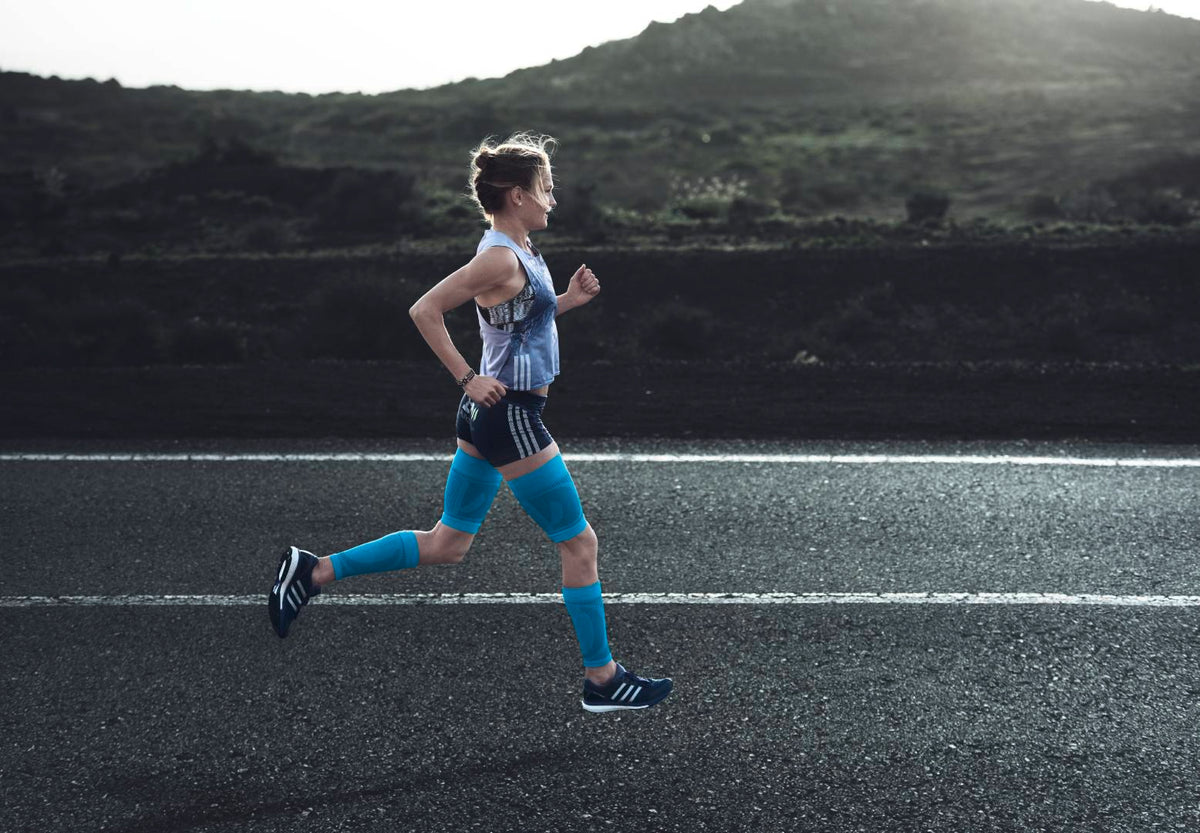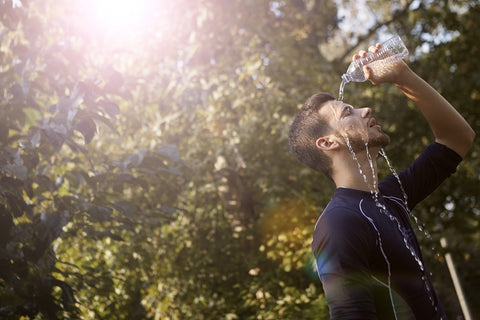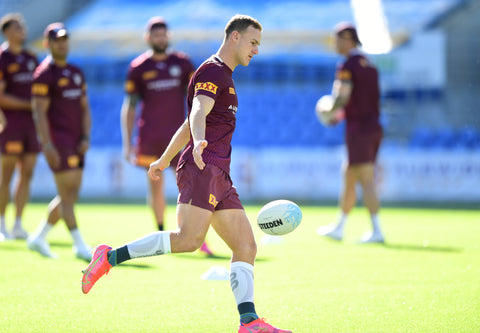Fuel, Rest, Compression: The Best Ways to Improve Your Sports Performance

Does it feel like everyone has an opinion on the best way for you to train, eat, and even relax before your big match? Unfortunately, not all those opinions are correct, and it can be hard to pick out the good from the bad. Fortunately, though, we have a long history of working closely with pro athletes like Georgia Godwin and Dirk Nowitzki, and State of Origin NRL teams (not to mention being the pioneers of compression technology). So, we know a thing or two about taking sports performance to the next level. Let’s get into it.
There is a wrong way to drink water

When it comes to drinking during high-intensity sports, the body can get finicky. Too little water and you become dehydrated and unfocused, and your blood flow (along with oxygen and nutrient delivery to the muscle) slows. Too much water and you start unbalancing your electrolyte levels.
The recommended fluid consumption levels vary depending on body weight, conditions (for example air conned gym vs outdoors in the summer heat), diet, and more. However, there are some guidelines you can follow to find the right amount of fluid intake for you.
To paraphrase the National Athletic Trainers’ Association, you should start every training session and match well-hydrated. That means drinking around 500-600 ml of water over the course of 2-3 hours before exercise and 200 ml of your favourite sports drink 10-20 minutes before. If it’s an especially hot day, drink a little more. And if it’s cold, a little less.
You should also try to get in 100-200 ml of fluids every 20 minutes or so, depending on how thirsty you get. Ideally, try to drink a sports drink as it will help replenish lost electrolytes.
Eat right

Get good eating habits. According to this systematic review of research into the nutritional needs of adolescent athletes, you need a diet composed of:
- 55-70% complex carbohydrates for long-lasting, sustainable energy
- 20% protein for building muscle tissue
- And 10-20% fat to absorb essential vitamins like A, D, E, and K and support healthy organ function.
Ideally, your carbs should come from whole grains and starchy veggies (like potatoes), proteins from fish, meats, and nuts, and fats from seeds, nuts, and avocados. Additionally, if you're a male athlete between 15-20 years old, you'll need 2600-3200 calories daily. And if you're a female athlete in that age group, you'll need 2000-2400.
Research also shows that to achieve your best out on the field, you should focus on high-carb foods. But don't try to load up on carbs too soon or too late. Carb-loading the night before doesn’t work as our bodies don’t store energy that way and eating within 3 hours of physical activity means all that good food won’t get processed quickly enough to make a difference.
And don't worry; you can still eat chocolate, fries, and pizza. You'll just need to balance them out with healthy food options and focus on those the day of your match.
Take enough time to recover

Recovery time can also vary quite a bit from athlete to athlete. But make no mistake - you do need it. Muscle tissue generally needs 24-48 hours of rest after strenuous physical activity. Working the muscle too soon will just lead to tissue breakdown instead of building. That’s why you shouldn't focus on the same muscle group for two sessions in a row if you’re trying to build strength before your match. There are leg days, core days, and arm days for a reason.
Along with adequate rest, you need a solid recovery routine.
- Cooldown: you shouldn’t abruptly stop exercising. Instead, take 10-15 minutes to cool down by taking a little walk or doing some stretches. You can also practise some drills (just make sure they’re not too strenuous). Cooling down will help keep your circulation up and muscles well-supplied with oxygen and nutrients.
- Replenish: drink some fluids (water, juice, Gatorade, doesn’t matter) and eat foods high in proteins, carbs, and good fats to help your body rebuild.
- Sleep well: between studies, socialising, and training, it can be hard to squeeze in extra sleep. But catching a couple more hours will help your body produce more growth hormone, which is responsible for tissue building and repair.
Use compression to improve your sports performance and recovery

Sports Compression Calf Sleeves
Many pro athletes swear by compression products - and for good reason. In no particular order, compression garments like our Sports Compression Calf Sleeves and Thigh Sleeves can:
- Boost blood flow. Better circulation means your muscles will be warmed up and ready for exertion. It also means boosted venous return (the rate at which your veins move blood to the heart). And lastly, you'll get less muscle fatigue and recover faster, as your muscles get the oxygen and nutrients they need (and remove the waste they don’t) quicker.
- Reduce muscle oscillation. Oscillations are the uncomfortable vibrations shooting up your legs when your feet hit the ground. Along with being uncomfortable, muscle oscillation can actually make you tire out faster and damage muscle tissues.
- Improve proprioception. Proprioception is essentially how well your muscles activate and how accurately your brain registers the positioning of your body. You won't get lightning-fast reflexes, but you will get better joint stability and slightly faster muscle activation. Not to mention, you’ll be less prone to injury and react a bit quicker while you play.
When picking out any kind of support, you’ll need to consider quality, fit, and purpose. Put simply, a compression sock or sleeve needs to be of medical-grade stock and fit you perfectly to be effective. A sports compression sock, for example, should feel a bit tighter around the ankle than the calf and fit snugly without feeling like it’s cutting off your circulation or like it's slipping. As for purpose, different sports focus on different areas of the body. Footy and track and field rely heavily on the legs, so arm compression sleeves won’t help there as much as they would in, say, gymnastics.
To sum up
If you want to improve your sports performance, you’ll need the right fuel, hydration habits, rest routine, and compression gear. These steps will keep your energy levels up, muscles strong and responsive, and mind focused.
Check out our full performance range: Bauerfeind Performance - Elite Compression Technology
If you require assistance selecting the right product for your needs or wearing the brace, call us on 1300 668 466 or contact us via live chat.
Do you have private health? Most private health extras will cover Bauerfeind Products, check to see if yours is included. Bauerfeind Private Health Insurance Inquiry.



